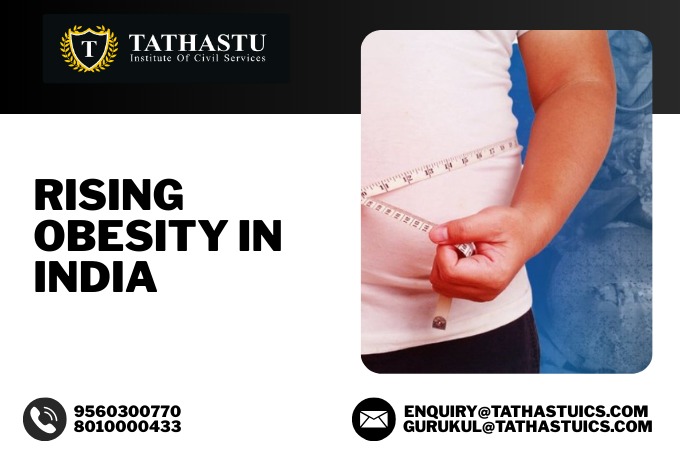The story of Indian health is changing fast, from worrying about hunger and undernutrition to now dealing with the challenges of too much weight and other related challenges. Even Prime Minister Modi has pointed out how obesity is behind many health problems and stressed the need to cut down on oily food. And it’s not a small issue: experts predict that by 2050, as many as 440 million Indians could be obese.
What is Obesity?
- A person is considered obese if they have an excessive quantity of body fat, which can have a detrimental effect on their health.
- The Body Mass Index (BMI), which compares a person’s height and weight, is typically used to measure it.
- A person is deemed obese if their BMI is greater than 30.
- A person is considered overweight if their BMI is between 25 and 30.
Causes of Obesity in India
- Unhealthy Diet: Eating too many foods high in sugar, fat, and salt, like fast food and processed snacks, adds extra calories that the body stores as fat. Over time, this imbalance leads to weight gain and obesity.
- Sedentary Lifestyle: Many people today spend most of their day sitting, whether at work, at home, or commuting. Lack of physical activity means fewer calories are burned, increasing the chances of gaining weight.
- Urbanisation: As more people move to cities, lifestyles become more sedentary with less space for outdoor activities. Busy urban life also promotes easy access to unhealthy convenience foods.
- Economic Barriers: Healthy foods like fruits and vegetables are often expensive or hard to access for low-income families. This pushes many to rely on cheaper, processed options that contribute to obesity.
- Genetics: Because of their genetic composition, certain people are inherently more likely to store fat. The way the body handles excess calories and metabolism might be influenced by family history.
- Psychological Factors: Emotional eating or overeating as a coping strategy can be brought on by stress, anxiety, and sadness. This frequently entails eating comfort foods that are heavy in calories and cause weight gain.
Impact of Obesity on Individuals and Economy
- Serious Health Risks: Obesity increases the chances of developing diseases like diabetes, heart disease, certain cancers, and joint problems.
- Early Onset of Illness: In India, people tend to suffer from heart attacks and high blood pressure around 10 years earlier than in many other countries, with obesity playing a major role.
- Childhood Obesity Concern: The number of obese children has surged dramatically in recent decades. Children who are obese often remain so as adults, facing long-term health issues.
- Economic Burden: Obesity leads to huge costs for medical treatments and causes loss of productivity, impacting both families and the national economy.
Government Initiatives to Prevent Obesity
- National Programme for Prevention and Control of Non-Communicable Diseases (NP-NCD): The National Programme for Prevention and Control of Non-Communicable Diseases (NP-NCD), formerly known as the National Programme for Prevention and Control of Cancer, Diabetes, Cardiovascular Diseases, and Stroke (NPCDCS), aims to prevent and control major NCDs.
- Ayush Holistic Wellness Centre: The Ayush Holistic Wellness Centre in the Supreme Court premises is a state-of-the-art facility providing holistic care addressing physical, mental and emotional well-being, promoting overall health of the Judges and staff of the Supreme Court of India.
- Mission Poshan 2.0: Mission Saksham Anganwadi and Poshan 2.0, also known as Mission Poshan 2.0, is a strategic program by the Government of India aimed at addressing malnutrition and improving the health, wellness, and immunity of children, adolescent girls, pregnant women, and lactating mothers.
- Fit India Movement: The mission of the Movement is to bring about behavioural changes and move towards a more physically active lifestyle.
- Eat Right Mela: The Eat Right Mela is a street food festival organized by the Food Safety and Standards Authority of India (FSSAI) to educate citizens about safe and healthy food choices.
Way Forward
- Restore Traditional Foods: Encourage local farmers and marketplaces to provide people with access to wholesome, fresh foods rather than merely manufactured ones.
- Foods That Are Unhealthy: Make healthy food more affordable and accessible while raising the price of bad food and sugary drinks.
- Raise Awareness: Obesity is a health problem that requires knowledge and attention; it is not only about appearance or willpower. People should learn how to prevent it and why it important via campaigns.
- Promote Movement: Parks, bike lanes, and playgrounds should be constructed by cities. Schools must incorporate healthy food and physical exercise into their regular schedules.
- Frequent Health Checks: Physicians should discuss obesity issues candidly and evaluate weight, waist circumference, and other metrics on a regular basis.
In conclusion, advising individuals to “eat less and move more” is not enough to combat obesity in India. It’s about fostering an atmosphere in which society supports and encourages healthy decision-making. It entails taking a comprehensive look at urban development, education, healthcare, and food regulations.

